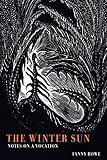As I attempt to conjure the most memorable books of the year, my mind returns to the titles I anticipated reading but for one reason, or a few, did not read. These yet-unread books provide the pleasure of anticipation coupled with the wistful remorse of neglect. Many held me in their thrall, albeit briefly; we dallied, but due to deadlines and distractions I couldn’t commit to their length. For some, like Javier Marias’s Your Face Tomorrow: Fever and Spear, Vanessa Place’s La Medusa, and Lydia Davis’s Collected Stories, I still pine, and have placed them at the head of next year’s list.
 Reading Joanna Howard’s On The Winding Stair (which I reviewed for Bomb) was like witnessing a dizzying set of pirouettes masterfully executed atop a parapet. Howard spins spare, seductive sentences and uses them to build worlds of dissipated wealth and decaying elegance, setting crumbling mansions among verdant pastures. Sailors, wraiths, rogues, and dandies populate these tales of kidnappings and escapes, and are often impelled by haunting desire. The book’s brevity defies its depth. I suggest reading and then rereading it.
Reading Joanna Howard’s On The Winding Stair (which I reviewed for Bomb) was like witnessing a dizzying set of pirouettes masterfully executed atop a parapet. Howard spins spare, seductive sentences and uses them to build worlds of dissipated wealth and decaying elegance, setting crumbling mansions among verdant pastures. Sailors, wraiths, rogues, and dandies populate these tales of kidnappings and escapes, and are often impelled by haunting desire. The book’s brevity defies its depth. I suggest reading and then rereading it.
 Poet, novelist, and here essayist Fanny Howe riffs on childhood, mysticism, consciousness, and writing as vocation in The Winter Sun. In this part-memoir, part-meditation, she rustles through her past while contemplating the nature of relationships and how identity is formed. Howe seems to have compressed many lives into her one, which includes trailing her mother’s friend, Samuel Beckett, around Paris; being mentored and chased (literally) by literary curmudgeon Edward Dahlberg; toiling long hours over books and words; dancing dressed in silver lamé. At the heart of Howe’s web of reflections and accounts of mystics, thinkers, and activists (including Simone Weil and Jacques Lusseyran) lies an examination of her vocation: “Why all this scratching and erasing? It was more like drawing an invisible figure than painting what was in front of me. I wanted something to recognize: a disembodied presence.”
Poet, novelist, and here essayist Fanny Howe riffs on childhood, mysticism, consciousness, and writing as vocation in The Winter Sun. In this part-memoir, part-meditation, she rustles through her past while contemplating the nature of relationships and how identity is formed. Howe seems to have compressed many lives into her one, which includes trailing her mother’s friend, Samuel Beckett, around Paris; being mentored and chased (literally) by literary curmudgeon Edward Dahlberg; toiling long hours over books and words; dancing dressed in silver lamé. At the heart of Howe’s web of reflections and accounts of mystics, thinkers, and activists (including Simone Weil and Jacques Lusseyran) lies an examination of her vocation: “Why all this scratching and erasing? It was more like drawing an invisible figure than painting what was in front of me. I wanted something to recognize: a disembodied presence.”
 In Nobody’s Home, writer Dubravka Ugresic uses a visit to a New York nail salon to depict the mish-mash of contemporary cultures, calls out celebrities as the new secular saints (and memoir the new hagiography), and debunks the romanticism of exile while deeming the suitcase its god. Ugresic’s identity as a former Yugoslavian, now Croatian, currently living in exile in Amsterdam informs her sharp, witty insights into modern transience, myths of identity, and the miscegenation of Eastern and Western European cultures. Lines at the MoMA to see an Eastern European artist’s exhibition prompts a memory of lengthy East German lines to buy laundry detergent twenty years before (she remarks it’s as if the New Yorkers are “returning the favor”); a large European market where families from a melange of ethnic groups pass their Saturdays shopping and eating (while their children intermingle and play) provokes Ugresic’s observation that the allegiance to ethnic identity prevents the groups from recognizing their greater commonality, class.
In Nobody’s Home, writer Dubravka Ugresic uses a visit to a New York nail salon to depict the mish-mash of contemporary cultures, calls out celebrities as the new secular saints (and memoir the new hagiography), and debunks the romanticism of exile while deeming the suitcase its god. Ugresic’s identity as a former Yugoslavian, now Croatian, currently living in exile in Amsterdam informs her sharp, witty insights into modern transience, myths of identity, and the miscegenation of Eastern and Western European cultures. Lines at the MoMA to see an Eastern European artist’s exhibition prompts a memory of lengthy East German lines to buy laundry detergent twenty years before (she remarks it’s as if the New Yorkers are “returning the favor”); a large European market where families from a melange of ethnic groups pass their Saturdays shopping and eating (while their children intermingle and play) provokes Ugresic’s observation that the allegiance to ethnic identity prevents the groups from recognizing their greater commonality, class.








